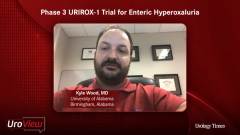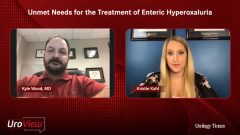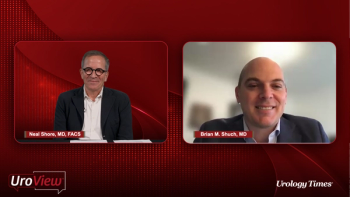
Challenges with available treatment options for enteric hyperoxaluria
An expert in endourology discusses concerns with currently available treatment options for enteric hyperoxaluria and comments on detecting the disease for patients with recurring stones.
Episodes in this series

Kristie Kahl: What are some concerns with the current treatment options available?
Kyle Wood, MD: The current concern is that some of our patients have profound enteric hyperoxaluria, so their oxalate levels can be extremely high. Despite our best management strategies with dietary management and supplementation, we still have issues reducing their oxalate. As we know, it is hard for patients to continuously manage their diets and various aspects. Following a dietary protocol, taking medications regularly, and all these interventions may not reduce oxalate perfectly. Those are the problems because there isn’t a perfect way to reduce oxalate levels and it requires a lot of commitment on both the physician’s side and the patient’s side.
Kristie Kahl: For patients who have recurring or complex kidney stones, are the providers treating them able to identify a enteric hyperoxaluria diagnosis?
Kyle Wood, MD: The best thing to do for all urology providers is to follow the AUA [American Urological Association] guidelines. If the patient has complex kidney stones or is a recurrent kidney stone former, we should be offering a metabolic workup, which would be a 24-hour urine test. In that 24-hour urine test, oxalate should be measured. That would help us identify the patients that have enteric hyperoxaluria because we would have an oxalate value and a history that would point to an enteric cause. That’s the best way to identify and manage these patients. As I had mentioned, I think, as a community and as urologists, we have not done enough work in working-up our patients and determining whether they have enteric hyperoxaluria or other causes of kidney stone disease.
Kristie Kahl: When it comes to pain management, where are the patients obtaining pain medications for their kidney stones?
Kyle Wood, MD: Pain management’s an interesting aspect. We’ve had an opioid crisis within the United States, and kidney stone formers aren’t immune, so they’ve been prescribed opioids over the course of many decades for their kidney stone events. Unfortunately, that has probably become an expectation when patients are having a kidney stone event. There’s plenty of data showing that opioids may not be needed and kidney stones can be managed with nonopioid medications. Opioids, during a patient’s initial kidney stone event, are oftentimes prescribed in the emergency department setting or the primary care setting. Data at our institution, the University of Alabama in Birmingham, Alabama, that we’ve looked at shows that for the most part, urologists aren’t the biggest prescribers for patients. They’re getting medication through the primary care setting as well as their pain physician, so a lot of patients under our pain contracts seek pain doctors for their opioids. Again, we as urologists perform surgeries on these patients and manage their kidney stone events, and we will be dealing with their pain medications, so we just need to be cognizant that kidney stones can be managed in other ways other than opioid treatments.
Transcript edited for clarity.
Newsletter
Stay current with the latest urology news and practice-changing insights — sign up now for the essential updates every urologist needs.









